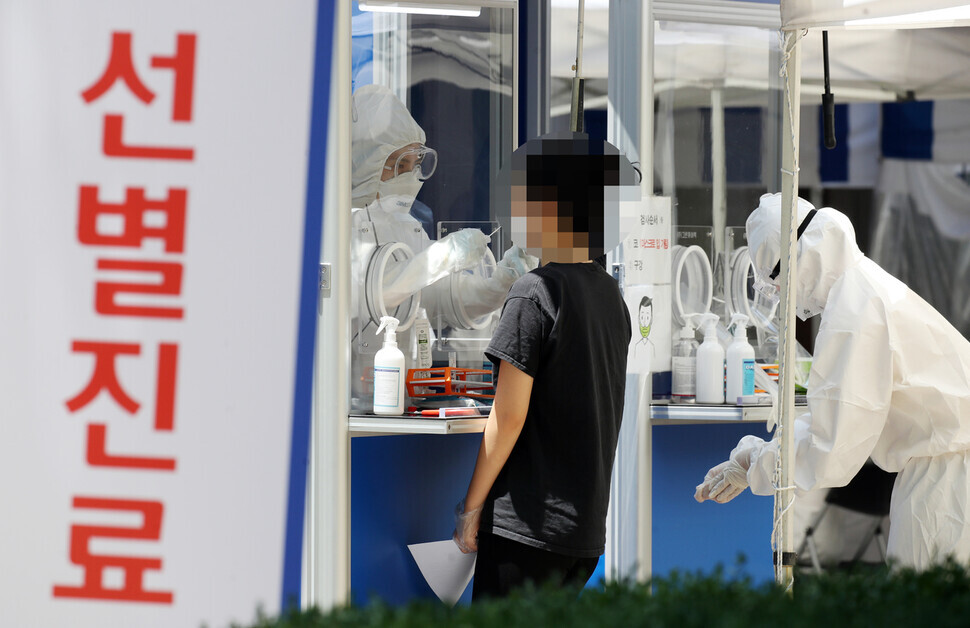hankyoreh
Links to other country sites 다른 나라 사이트 링크
Serious COVID-19 cases linked to 4 key factors, S. Korea researchers find

Diabetes, high fever, low oxygen levels, and major heart damage are four symptoms that correlate to severe cases of COVID-19, a new study reports. This is the first study in South Korea confirming the risk factors that are predictive of a serious case of the disease.
The report, titled “Prognostic Factors for Severe Coronavirus Disease 2019 in Daegu, Korea,” was published in the Journal of Korean Medical Science (JKMS) by a research team at the Yeungnam University College of Medicine, in Daegu. The researchers analyzed 110 COVID-19 patients (23 serious cases) from Feb. 19 to Apr. 15.
The study found that 48.3% of COVID-19 patients with diabetes developed a serious case, compared to just 11.1% of patients without diabetes. The study found that 41.0% of patients with a body temperature at or above 37.8 degrees developed a severe case, compared to 9.9% of those with a lower temperature. Moreover, 58.6% of patients with peripheral oxygen saturation (oxygen paired with hemoglobin in the blood) below 92% developed a severe case, compared to 7.4% of patients with oxygen saturation at or above 92%. A whopping 85.7% of patients whose level of Creatine Kinase-MB (an enzyme used to measure the degree of heart damage) exceeded 6.3ng/ml developed a severe case, compared to 31.6% of those with a lower level.
“A serious case developed in 100% of patients with three or four symptoms, 60% of patients with two symptoms, and 13% of patients with just one symptom. Appropriate assessment and close monitoring of risk factors should make it possible to reduce the fatality rate,” the researchers said.
By Choi Ha-yan, staff reporter
Please direct comments or questions to [english@hani.co.kr]]

Editorial・opinion
![[Column] How opposing war became a far-right policy [Column] How opposing war became a far-right policy](https://flexible.img.hani.co.kr/flexible/normal/500/300/imgdb/original/2024/0702/5017199091002075.jpg) [Column] How opposing war became a far-right policy
[Column] How opposing war became a far-right policy![[Editorial] Korea needs to adjust diplomatic course in preparation for a Trump comeback [Editorial] Korea needs to adjust diplomatic course in preparation for a Trump comeback](https://flexible.img.hani.co.kr/flexible/normal/500/300/imgdb/original/2024/0702/9717199086060096.jpg) [Editorial] Korea needs to adjust diplomatic course in preparation for a Trump comeback
[Editorial] Korea needs to adjust diplomatic course in preparation for a Trump comeback- [Editorial] Silence won’t save Yoon
- [Column] The miscalculations that started the Korean War mustn’t be repeated
- [Correspondent’s column] China-Europe relations tested once more by EV war
- [Correspondent’s column] Who really created the new ‘axis of evil’?
- [Editorial] Exploiting foreign domestic workers won’t solve Korea’s birth rate problem
- [Column] Kim and Putin’s new world order
- [Editorial] Workplace hazards can be prevented — why weren’t they this time?
- [Editorial] Seoul failed to use diplomacy with Moscow — now it’s resorting to threats
Most viewed articles
- 110 days of torture: Korean mental patient’s restraints only removed after death
- 2Nine dead in Seoul after car plows into pedestrians
- 3[Editorial] Korea needs to adjust diplomatic course in preparation for a Trump comeback
- 4[Column] How opposing war became a far-right policy
- 5Samsung Electronics workers to go on first strike in company’s 55-year history
- 6Korea to create dedicated population strategy ministry to combat low birth rate, aging society
- 7[Editorial] Silence won’t save Yoon
- 8Japan is building a military meant for more than self-defense — and has the US to thank for it
- 9NewJeans rocks Tokyo Dome as new, younger generation of K-pop fans emerges in Japan
- 10S. Korea joins US, Japan for first multi-domain drills at a time of escalating tensions